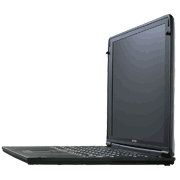The Pedion was the world’s thinnest (18 mm) and lightest (1.45 kg) A4 notebook computer when it was announced by Mitsubishi Electric in September 1997. It featured some of the world’s most sophisticated technology to realize a slim 6.2-millimeter LCD screen, a low-profile 3.6-millimeter keyboard, a thin 6.5-millimeter lithium-polymer battery, and a magnesium diecast shell with a thickness of only 1.0 to 1.2 millimeters.
The LCD screen was a 12.1-inch SVGA display (800 x 600 pixels) capable of rendering 65,536 colors. The keyboard had a key pitch of about 19 mm. The computer could run for about 1.8 hours on the internal battery and up to 7.2 hours when the add-on battery pack was used.
The Pedion’s CPU was a low-power Intel Pentium processor (either 200 MHz or 233 MHz) with MMX technology. The computer came with 32 MB of RAM and a 128-bit high-speed video accelerator for performance levels rivaling those of desktop computers.
The Pedion was standard equipped with two PC card slots compatible with card bus and zoomed video (ZV) ports, enabling network access via LAN, ISDN, PHS, and digital cellphone. It came standard with a USB port and an infrared communications port (IrDA 1.1). A 20x CD-ROM drive, flexible disk drive, stereo speakers, and interfaces for a mouse and printer were housed in the expansion unit that was only 22 millimeters high.
The Pedion ran Microsoft Windows 95 as its operating system.
| CPU | Processor | 200 MHz or 233MHz Pentium processor with MMX technology |
|---|---|---|
| High-speed math coprocessor (optional) | Built in the CPU | |
| Memory | ROM | 512KB |
| RAM | 32MB (fixed) | |
| Primary cache | 32KB (built in the CPU) | |
| Secondary cache | 256KB | |
| Secondary cache | 1.1 MB (built in the graphics accelerator) | |
| Auxiliary Storage devices | Hard disk drive | 1.0 GB (enhanced IDE) |
| Display device | Display method | 12.1-inch TFT color LCD screen |
| Display colors, resolution | 65,536 colors, SVGA (800 x 600 pixels) | |
| Graphics accelerator | Neomagic MagicGraph 128 | |
| Keyboard | 85 keys, OADG compliant | |
| Pointing device | Tablet pointer (two buttons) | |
| Interfaces | USB | One channel |
| PC card | Two JEITA 4.2/PCMCIA 2.1-compliant Type II slots (Card bus/ZV board compatible) | |
| Infrared communications port | IrDA 1.1 compliant | |
| Security functions | Power-on password | |
| Power supply | Battery | Lithium-polymer battery (11.1 V, 1,700 mAh), standard, not replaceable |
| Battery operating time | ~1.8 hours | |
| Battery charging time | ~3 hours (charged from the computer, can be charged while computer is in use) | |
| Add-on battery pack (optional) | Lithium-polymer battery (11.1 V, 5,100 mAh / 1,700 mAh) | |
| AC adaptor | 100 - 240 VAC ± 10%, 50/60 Hz | |
| Power consumption | 42 W max. | |
| Dimensions [mm] | 297 x 218 x 18 (w x d x h) | |
| Weight | 1.45kg | |


